Nanu Exchange Crypto Exchange Review: What Happened and Why It Shut Down
Crypto Exchange Risk Calculator
Evaluate Exchange Safety
Use this tool to assess the risk level of cryptocurrency exchanges based on key factors discussed in the Nanu Exchange review.
Back in 2017, Nanu Exchange launched as a Brazilian-focused cryptocurrency trading platform, promising easy access to Bitcoin, Ethereum, and other major coins for local users. It wasn’t Binance. It wasn’t Coinbase. But for a while, it seemed like a solid option for Brazilians looking to trade crypto without jumping through international hoops. Then, in November 2020, it just… disappeared.
What Nanu Exchange Actually Offered
When it was running, Nanu Exchange let users trade Bitcoin (BTC), Ethereum (ETH), Litecoin (LTC), XRP, Tron (TRX), and Dogecoin (DOGE). It supported direct deposits and withdrawals in Brazilian reais (BRL), which was a big deal at the time. Most international exchanges didn’t offer that, so local users appreciated not having to use third-party payment processors. Fees were standard for a mid-tier exchange: 0.25% for takers, 0.15% for makers. Bitcoin withdrawals cost exactly 0.0008 BTC - right in line with the global average. That’s not bad. But here’s the catch: volume was tiny. At its peak, Nanu Exchange handled just 0.98 BTC in daily trading volume. Compare that to Binance, which moves over 100,000 BTC daily. Nanu Exchange wasn’t just small - it was barely on the radar. Its top trading pairs were BTC (47.17%), XRP (25.86%), and ETH (18.95%). That means most of its users were buying and selling Bitcoin, with XRP and Ethereum trailing behind. The rest of the altcoins barely moved. Low volume meant wide spreads and slippage. If you tried to trade more than a few hundred dollars’ worth of crypto, you’d quickly realize prices didn’t match what you saw on larger exchanges.Why Users Lost Trust
The biggest complaints from users weren’t about fees. They were about reliability. Multiple reports on Revain describe logging in to find a blank page or a message that simply said “Taboo.” That’s not a glitch - that’s a shutdown. Users couldn’t access their accounts. Withdrawals stopped. Customer support vanished. One user wrote: “Not very many, right around not many” positive things. They pointed to three major problems: low liquidity (hard to buy or sell without moving the price), no helpful guides (no tutorials, no FAQs), and a terrible interface (“uteiti interface” - likely a typo for “ugly interface”). There was no official announcement. No email. No social media post. Just silence. By July 2021, the website was dead. No one ever explained why.Trust Score: One of the Lowest in the Industry
BeInCrypto gave Nanu Exchange a trust score of just 3 out of 10. That’s lower than most exchanges you’ve never heard of. At one point, it ranked #596 in trustworthiness. By the time it shut down, it had dropped to #764. That’s not a fluke. That’s a pattern. Unlike Binance or Kraken, Nanu Exchange had no regulatory oversight. No license. No audit reports. No public proof of reserves. That’s not unusual for small exchanges - but it’s dangerous. When things go wrong, users have zero legal recourse. And in Nanu’s case, they got nothing. CoinMarketCap labeled it an “Untracked Listing.” That means even the data on its trading volume couldn’t be verified. If you can’t trust the numbers, why trust the platform?Why It Failed When Brazil Was Booming
Here’s the irony: Nanu Exchange shut down right as Brazil’s crypto market was exploding. In 2020, Brazil had one of the highest rates of crypto adoption in Latin America. People were buying Bitcoin to protect savings from inflation. Mercado Bitcoin and Foxbit were growing fast. International platforms like Binance and Coinbase were expanding into Brazil. Nanu Exchange didn’t adapt. It didn’t improve its app. It didn’t add more coins or better security. It didn’t hire support staff. It didn’t even update its website. Meanwhile, competitors offered mobile apps, 24/7 customer service, and educational content. Nanu stayed stuck in 2017.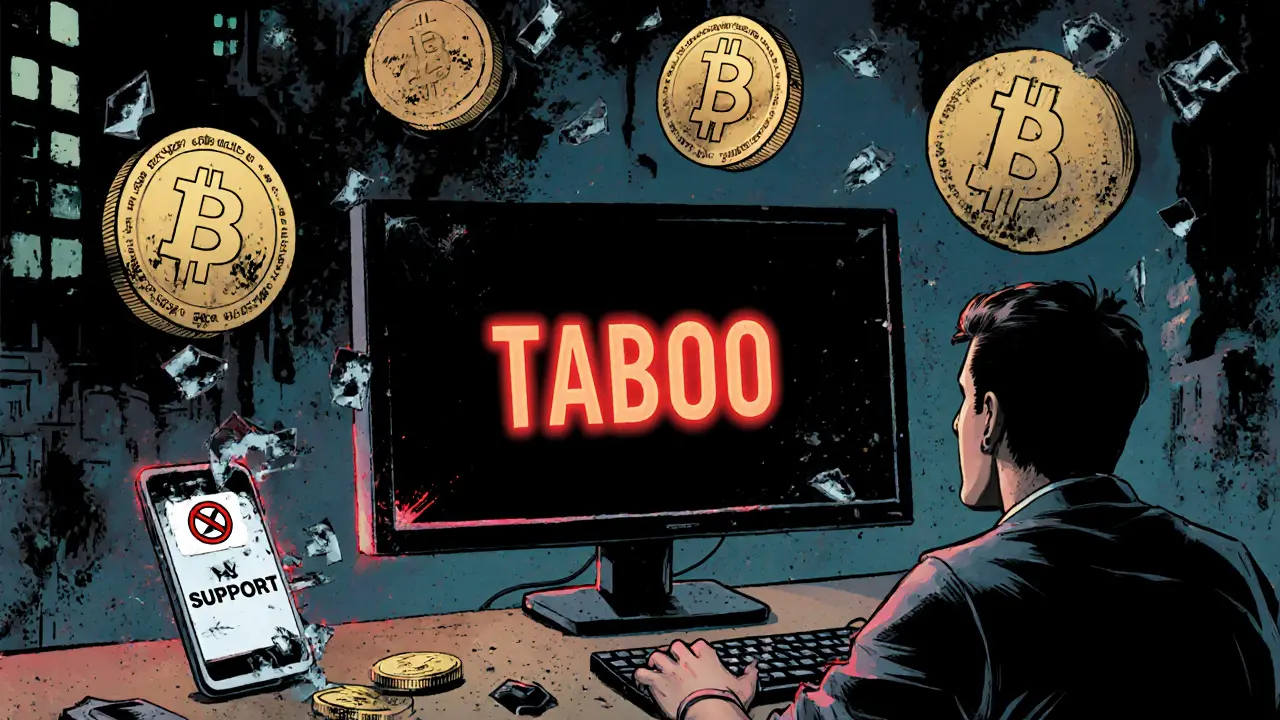
What Happened After the Shutdown
There’s no record of Nanu Exchange ever reopening. No new domain. No social media revival. No announcement from former staff. The domain likely expired. The servers were turned off. Users who had funds on the platform lost them. No refunds. No compensation. No legal action that made headlines. Today, former users have moved to Mercado Bitcoin, Foxbit, or international platforms like Binance and Kraken - all of which support BRL deposits and have strong security and customer support. Some even use peer-to-peer platforms like Paxful or LocalBitcoins to buy directly from other Brazilians.What You Can Learn From Nanu Exchange
Nanu Exchange isn’t just a footnote in crypto history. It’s a warning. Small exchanges can disappear overnight - and you might lose everything. Even if a platform looks legit, if it’s not regulated, has low volume, and doesn’t communicate with users, it’s a ticking time bomb. Always check:- Is the exchange regulated or licensed anywhere?
- What’s its daily trading volume? (Look at CoinGecko or CoinMarketCap)
- Are there recent user reviews? Or are all the reviews from 2020?
- Does it have a working support system? Try contacting them before depositing.
Is Nanu Exchange Still Operating?
No. Not even close. The website is offline. The domain is inactive. No one is answering emails. No one is responding on Twitter or Telegram. The exchange shut down permanently in November 2020. Any site claiming to be Nanu Exchange today is either a scam or a copycat.
Alternatives to Nanu Exchange for Brazilian Users
If you’re looking for a reliable exchange in Brazil, here are three solid options:| Exchange | Supported Fiat | Trading Pairs | Regulated? | Mobile App | Customer Support |
|---|---|---|---|---|---|
| Mercado Bitcoin | BRL | BTC, ETH, LTC, XRP, DOGE, and more | Yes (Central Bank of Brazil) | Yes | 24/7 live chat and email |
| Foxbit | BRL | BTC, ETH, XRP, BCH, and 10+ others | Yes (AML/KYC compliant) | Yes | Email and ticket system |
| Binance (Brazil) | BRL | 200+ crypto pairs | No (global platform, not locally licensed) | Yes | 24/7 support, multilingual |
Frequently Asked Questions
Was Nanu Exchange a scam?
There’s no proof Nanu Exchange was a deliberate scam. It operated legally for a few years and processed real trades. But it was poorly managed, lacked transparency, and failed to respond to user concerns. That’s not necessarily fraud - but it’s still dangerous. Many users lost access to their funds with no recourse, which is just as bad.
Can I recover my funds from Nanu Exchange?
No. The exchange shut down in November 2020. Its servers are offline, and there’s no company or team left to handle withdrawals. If you had funds on Nanu Exchange, they are gone. This is why it’s critical to only use exchanges with strong track records and clear regulatory status.
Why did Nanu Exchange shut down?
No official reason was ever given. Experts believe it failed due to low trading volume, poor user experience, lack of investment, and inability to compete with larger platforms. Brazil’s crypto market was growing fast, but Nanu Exchange didn’t grow with it. It was outpaced and eventually abandoned.
Is there a new version of Nanu Exchange?
No. Any website or app claiming to be Nanu Exchange today is fake. The original platform ceased operations permanently. Be careful of phishing sites or copycat apps trying to steal your login details or crypto.
Should I avoid Brazilian crypto exchanges?
No. Brazil has some of the most active crypto users in Latin America - and some of the best local exchanges. Mercado Bitcoin and Foxbit are safe, regulated, and reliable. The problem wasn’t that Nanu Exchange was Brazilian. The problem was that it was small, unregulated, and poorly run. Always choose exchanges with transparency, liquidity, and support.

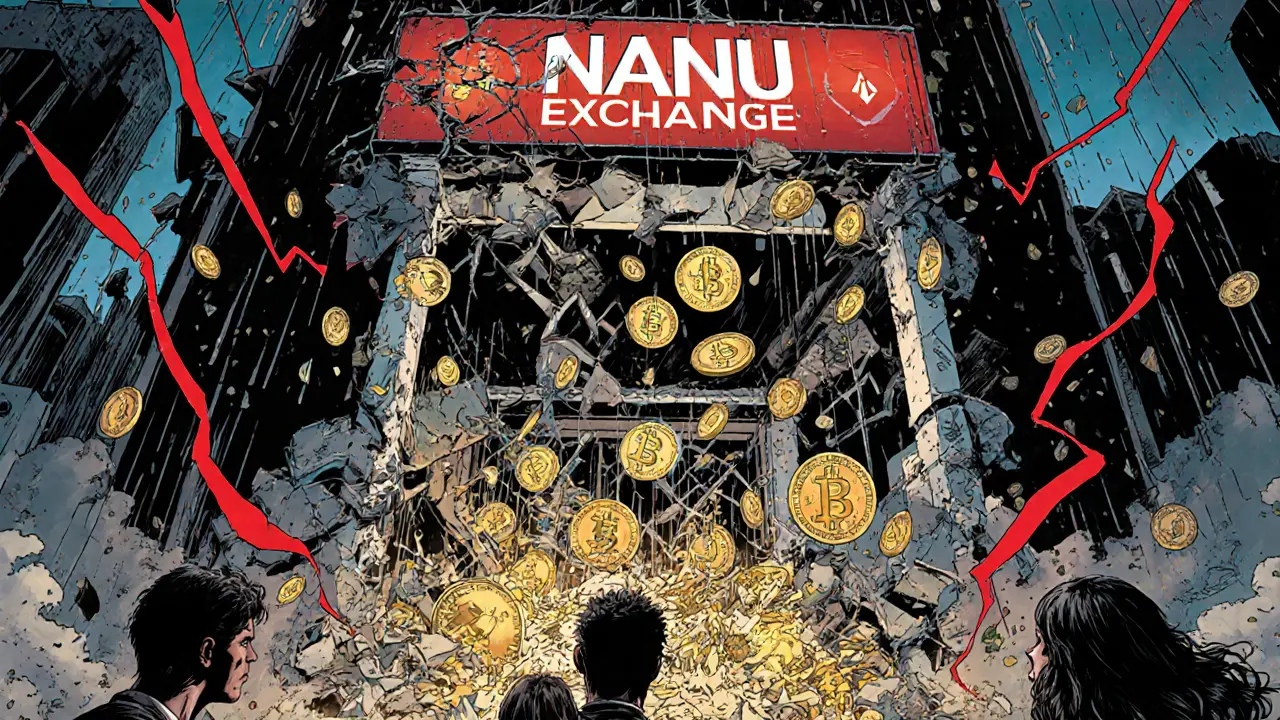

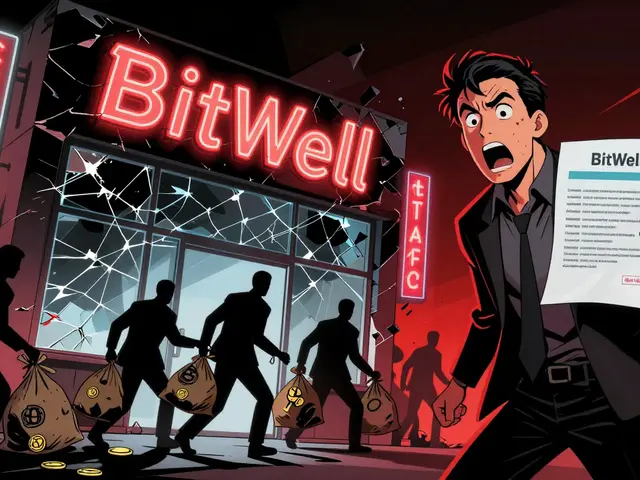
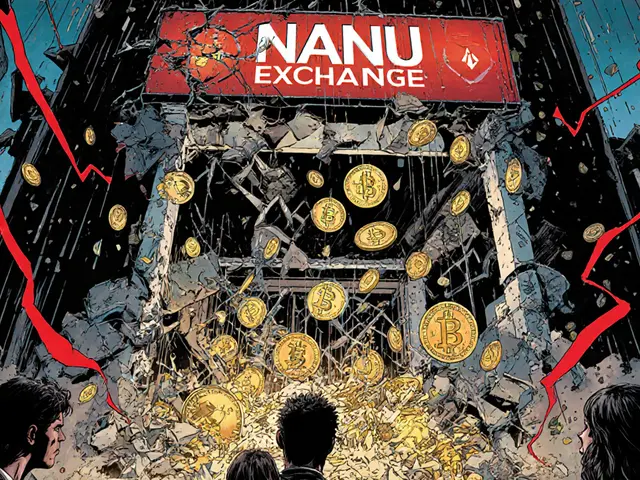



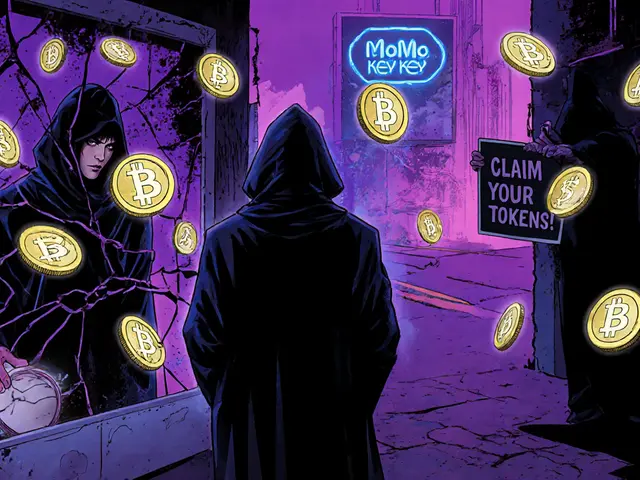
Wow, this is wild. I had no idea a crypto exchange could just vanish like that. No email, no warning, just... gone. People lost money and no one even said sorry. That's not business, that's abandonment.
And Brazil was booming too? Makes it even sadder. They had the market, they just didn't have the will to grow.
Lesson learned: if it doesn't look like it's trying, it's probably already dead.
Trust score: 3/10. Volume: 0.98 BTC/day. Regulatory status: None. Conclusion: Predictable collapse. This wasn't a failure-it was a mathematical certainty.
Can you believe it?! One day you're trading Bitcoin like it's cash, the next-BAM!-the whole site says 'Taboo'? Like some ancient curse?!
No updates. No support. No explanation. Just silence. And people thought they were safe?!
It’s like leaving your house unlocked and then being shocked when the TV disappears. This wasn’t bad luck-it was negligence on steroids!
And now? The whole crypto world moves on, but those users? They’re stuck with nothing but memories and a lesson they paid for in crypto.
Someone should write a documentary about this. It’s pure tragedy wrapped in a 2020 tech failure.
And don’t even get me started on the ‘untracked listing’ label. That’s not just a footnote-it’s a tombstone.
Oh, so now we’re treating a failed startup like a Greek tragedy? Cute.
It wasn’t magic. It was just another small-time operation that thought ‘BRL support’ was a magic bullet. Spoiler: it’s not. You still need a website that works, a team that answers emails, and a plan that doesn’t end in 2017.
And yes, Brazil was booming-but that doesn’t mean every local player gets a trophy. Some just get a Wikipedia page.
Next time, maybe don’t name your exchange after a typo. Nanu? Really?
Man, I remember when I tried Nanu. I thought it was fine at first-easy BRL deposits, simple UI. But then I tried to move $500 and the spread was insane. Like, I lost $20 just from slippage.
And when I asked support? Nothing. Not even a ‘we’re working on it.’ Just radio silence.
Then one day, boom. Dead site.
Lesson? If your exchange looks like it was built in 2015 and hasn’t changed since, it’s already dead. You just don’t know it yet.
Of course it shut down. Who in their right mind trusts a Brazilian exchange with zero regulation? Zero transparency? Zero accountability?
This is why the West must never allow unregulated financial entities to operate-even if they're 'local.' This is how nations get destroyed-from the inside, by crypto grifters hiding behind ‘BRL support’ and pretty UIs.
And now the U.S. is waking up to this? Too late. The damage is done. The next one will be worse. Mark my words.
They didn’t just vanish-they were never real to begin with. A digital ghost town. A scam waiting to happen. And now? They’re laughing from the shadows.
rip nanu 😔
used it back in the day. loved the BRL deposits. hated the interface. one time I tried to withdraw and it just spun for 3 days. then it vanished.
still use mercado bitcoin now. way better. no regrets.
btw, anyone else miss when crypto felt like a wild west? now it's just big banks with crypto logos.
It’s heartbreaking to see how easily people get burned in crypto. Not because it’s complex-it’s because platforms like Nanu exploit the trust of people who just want to save their money.
This isn’t just about tech. It’s about responsibility. A platform that doesn’t communicate isn’t a service-it’s a gamble with your life savings.
And yet, people still fall for it. Why? Because they don’t know how to ask the right questions.
Education is the only real security in crypto. Not cold wallets. Not memes. Not hype. Just knowing what to look for.
Thank you for this post. It’s a public service.
Nanu was never the problem. Brazil is. You think a country that can’t even manage its own banking system can run a crypto exchange? Give me a break. They had the market, the demand, the people-but zero governance. Of course it collapsed. It was always going to. The real question is why anyone thought it would last. No one was watching. No one cared. And now? The victims are the ones who trusted the system instead of questioning it. Classic.
Let me be perfectly clear: Nanu Exchange was not merely a failed business. It was a reckless, negligent, and fundamentally irresponsible entity that operated without oversight, without transparency, and without regard for its users’ financial well-being.
That it was ever allowed to function under any circumstances is a scandal. That users lost funds is not an unfortunate accident-it is the direct and foreseeable consequence of institutional malpractice.
There is no excuse. No justification. No ‘it was small’ that absolves this. This is why regulation is non-negotiable. This is why due diligence is not optional. And this is why anyone who trusted Nanu should be ashamed of themselves for not doing their research.
And yet, here we are. Still learning the same lesson. Again.
Yeah, I heard about Nanu. Didn’t use it. Saw the reviews. Didn’t bother. Good riddance.
Always check: Is it regulated? Is volume real? Is support responsive?
That’s it. Three questions. If the answer to any is ‘no’-walk away.
Simple. No drama. No fluff. Just survival.
Man I used Nanu for like 6 months. Their UI was a mess but the BRL deposits were smooth. I remember trying to withdraw once and it took 5 days. Then I got an email saying ‘system maintenance’ and never heard back.
Turns out they were just waiting for the servers to die. I lost $800. Didn’t even report it. Too late, too quiet.
Now I use Foxbit. No complaints. App works. Support replies. Even has a help section. Who knew?
Pro tip: if your exchange doesn’t have a FAQ page, it’s probably not gonna be around next year.
Let me be blunt: Nanu Exchange didn’t fail because it was small. It failed because it was lazy.
It didn’t invest in security. It didn’t hire support. It didn’t update its platform. It didn’t even fix its broken interface. It sat there like a rusted car with a full tank of gas-waiting for someone to notice it was dead.
And guess what? They did notice. But only after they couldn’t get their money out.
This isn’t a cautionary tale about crypto. It’s a cautionary tale about complacency.
Every time you say ‘it’s fine for now,’ you’re one step closer to losing everything.
Don’t be Nanu. Don’t be the person who thought ‘good enough’ was enough.
Build. Improve. Communicate. Or get out of the way.
THIS IS THE CRYPTO WILDFIRE WE NEVER TALKED ABOUT.
Nanu didn’t just shut down-it exploded into silence. No fanfare. No press release. No ‘thank you for your trust.’ Just... void.
Imagine pouring your life savings into a house, then one morning the walls vanish. No demolition notice. No contractor. Just empty space.
That’s what happened. And now? The world moves on. But the people who lost everything? They’re still staring at the ghost of a website.
Don’t let your crypto journey end like this. Choose platforms that breathe. That respond. That care.
Because in crypto, silence isn’t peace-it’s the sound of your money disappearing.
Nanu was a joke. Low volume no support no regulation. Anyone who used it deserved to lose. Simple as that
Let’s be honest: this is what happens when you let a third-world country run financial infrastructure. Brazil’s central bank is a joke. Their banking system is a mess. And now this? A crypto exchange with zero oversight, zero accountability, and zero future?
Of course it vanished. It was never meant to last. This is not a lesson in crypto. This is a lesson in geography.
Stick to regulated, Western-based exchanges. Anything else is a gamble with your future.
And don’t tell me ‘but it was local’-local doesn’t mean safe. It just means easier to exploit.
Nanu? Pfft. I told my cousin not to use it. Said it looked like a 2012 website with a Brazilian flag slapped on. He didn’t listen. Lost 15k INR. Now he uses Binance. Should’ve listened to me. I’m always right.
The real tragedy isn’t the shutdown-it’s the illusion of legitimacy. Nanu didn’t deceive because it was malicious. It deceived because it was indifferent.
And indifference is more dangerous than fraud. Fraud you can trace. Indifference? It leaves no trail. Just silence.
This is the existential crisis of decentralized finance: when trust is decentralized, so is responsibility. And when no one is responsible, everyone is abandoned.
Nanu didn’t die because it was small. It died because it forgot that finance is not code-it is human.
And humans, even in crypto, need to be seen. Heard. Answered.
They weren’t.
Nanu was trash. Don't use it. Use Mercado. Done.
Re: Comment from 1165 - 'rip nanu 😔'
Emotional attachment to a failed financial entity is irrational. This wasn't a pet. It was a platform that failed to meet fiduciary minimal standards. Mourn the loss of funds, not the brand.